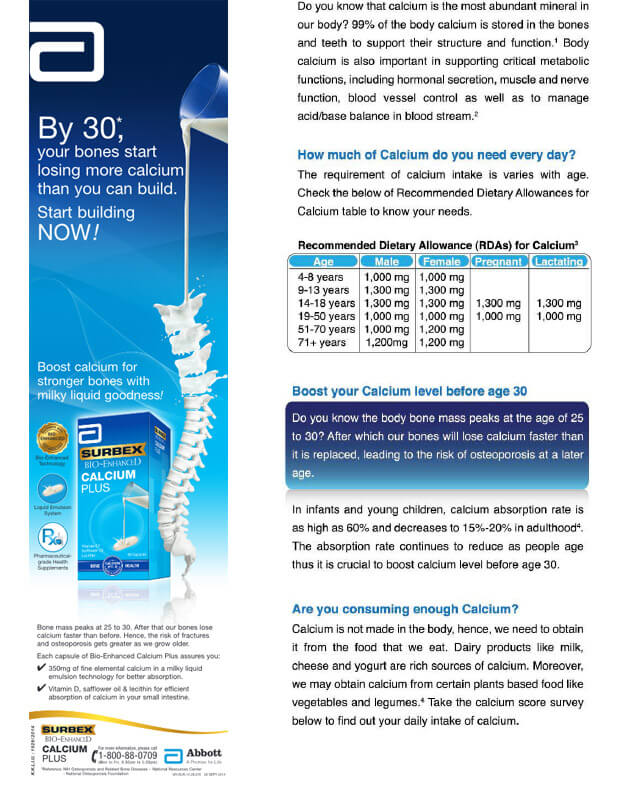Boost Your Energy Boost Your Life Today
Boost Calcium For Stronger Bones

References:
Tee. ES. Ismail MN, Nasir, A Khatijah I. Nutrient Composition of Malaysian Foods, Malaysian Food Composition Database Program C/O Institute for Medical Research Kuala Lumpur, 1997.
Keep Diabetes Under Control
Like to know more about Diabetes Self-Care Management, download the booklet below:
Neutralize Your Uric Acid problem before it's too late!
Understanding Uric Acid
Uric acid is a waste product from the break down of purine, a substance that is made within our body and found in many of the foods we eat. It is excreted through our urine, but when too much uric acid builds up it can cause attacks of painful arthritis (gout) especially in toes and fingers. It can also result in kidney stones and blockage in the kidney.
Watch out for these foods
Certain foods trigger high level of uric acid in your body. Cut down on purine-rich foods such as organ meat, goose, duck, anchovies, mackerel, scallops, mussels and also moderate purine-rich vegetable such as asparagus, cauliflower, spinach, mushroom and green peas. Another agitator is the over-consumption of alcohol especially beer.
Indulging in these foods will increase uric acid in the blood – hyperuricemia - causing urine to become acidic. Eventually, the uric acid will crystallize in joints and tissues to trigger off a gout attack if the uric acid is not reduced.
High Uric Acid level

Prevention is key
- Reduce intake of purine-rich foods
- Develop a regular exercise routine
- Drink more water – hydrate, hydrate, hydrate
- Avoid alcohol & caffeine, which causes dehydration that leads to uric acid crystallization
- If overweight, reduce weight to prevent chronic conditions like hyperuricemia
- Regular consumption of urine alkalinizer will help to normalize the urinary system
Breakdown Uric Acid buildup before it hurts!
Consult your healthcare professional today to find out how Ural can help to neutralize your uric acid problem.
Ural Effervescent Granules
Pleasantly flavoured Urinary Alkalinizer
References:
1. Product Information
Calcium Up Close
We are quite used to hearing about how important calcium is for our well-being. When you were a child, you were often told, "Drink your milk or you won't grow!". Now you are told, "Do you want brittle bones when you're old?"
It seems like these warnings will never cease – and with good reason too. Calcium is extremely important for good bone and teeth health. And seeing as how common osteoporosis has become, we had better start taking heed.
The daily diet of many people does not meet the recommended daily intake of calcium, which is why they rely on supplements.
Calcium in supplements is not pure calcium, but a compound of calcium and another element. There are a number of different compounds - calcium carbonate, calcium citrate, calcium phosphate and calcium lactate, of which the first two are the most common. One of the key factors that differentiate the different compounds is the amount of elemental calcium contained.
Calcium Carbonate
Calcium carbonate (CaCO3) is one of the main types of calcium found in supplements and is available in different forms - liquid, tablets and capsules. It is one of the less expensive forms, but has a relatively high amount of elemental calcium.
Calcium carbonate has an alkaline base and requires more stomach acid for maximum absorption. Therefore, it is best to take this supplement after meals.
Primarily prescribed as a dietary calcium supplement, calcium carbonate is also a frequent ingredient in antacids for the treatment for stomach ache, acid reflux and indigestion.
Not limited to health and medicinal products, this compound is also found in household items such as toothpaste and baking powder.
Calcium carbonate is not recommended for those with low levels of stomach acid (absorption is not as good) as it may cause constipation and bloating.
Certain diuretics that contain thiazide may also react adversely with calcium carbonate.
Calcium carbonate can cause a number of side effects, including nausea, vomiting, constipation, stomach ache and metallic taste.
Calcium citrate
Calcium citrate (Ca3(C6H5O7)2) is a more expensive calcium compound, but it is easily digested and absorbed. However, it contains less elemental calcium than calcium carbonate. It is also available in different forms, such as pills and effervescent tablets.
Individuals on antacids with aluminium content should consult their doctors before taking calcium citrate supplements. This is because calcium citrate may increase the amount of aluminium absorption into bloodstream, which is particularly dangerous for those with kidney disease. Those who have had kidney stones should also be careful and seek medical advice before taking this form of calcium.
Other forms of calcium
Calcium phosphate actually belongs to a family of different minerals which combine calcium ions (Ca2+) and either orthophosphates (PO43-) or pyrophosphates (P2O74-).
Calcium phosphate is used to treat and prevent calcium deficiencies. Besides supplements, calcium phosphate is also found in cosmetics and industrial chemicals.
Calcium gluconate (C12H22CaO14) has multiple uses. As with other forms, it treats calcium deficiencies resulting from conditions like hypoparathyroidism. It is also administered to those who suffer from rickets and osteomalacia. It is not a form that is normally found in supplements as it is administered intravenously.
Calcium lactate (C6H10CaO6) is used in both antacids and calcium supplements. Unlike other forms of calcium, it does not need to be taken with food as it does not require an acidic condition for absorption. It is frequently added to sugar-free foods as a preventive measure against tooth decay.
Conclusion
Calcium should be an essential part of your daily dietary intake, not only for building healthy bones and teeth, but also for other body functions like blood clotting and regulation of heartbeat.
Before taking calcium supplements, it is best to consult your physician, who can help decide which type is right for you and to avoid any unwanted interactions or side effects.
References:
1) Office of Dietary Supplements. Available at http://ods.od.nih.gov
2) The Internet Drug Index. Available at www.rxlist.com
3) Industrial Mineral Association. Available at www.ima-na.org
4) Medline Plus. Available at www.nlm.nih.gov
5) University of Maryland Medical Centre. Available at www.umm.edu
6) National Institute of Arthritis and Musculoskeletal and Skin Diseases. Available at www.niams.nih.gov
A Fish A Day For A Healthy Heart
Fish contains Omega-3 fatty acids which consists of eicosapentaenoic acid (EPA) and docosahexaenoic acid (DHA). These fatty acids are not produced by the body and needed to be obtained from diet or dietary supplements. Omega-3 fatty acids are vital in protecting our hearts by :
- Lowering blood pressure and triglycerides levels by 25 - 30%1
- Maintaining healthy blood vessel2
Fish is one of the sources of Omega-3 fatty acids and the chart below indicates the best type of fishes to consume :

Are You Getting Enough Omega-3 From Fish ?
Fish is an excellent source of Omega-3 fatty acids and the US National Institute of Health recommends a daily intake of 500-1000mg of Omega-3 fatty acids. Smaller fishes such as mackerel, sardine, and anchovies are rich in Omega-3 fatty acids. It is advisable to avoid shark, swordfish and tilefish as they may contain high levels of mercury, dioxin and heavy metals which are harmful to our health.
While choosing the right fish is important, the process of preparing it is crucial. Deep or stir frying fish exposes it to high heat resulting in the oxidation of Omega-3 fatty acids. It is best to steam, grill or take fish raw to reduce its exposure to direct heat.
To ensure your heart health with fish, experts recommend fish oil supplements as an alternative.
ABBOTT BIO-ENHANCED (BE) FISH OIL PLUS
Each ABBOTT BIO-ENHANCED FISH OIL PLUS capsule contains high concentration of Omega-3 fatty acids, especially EPA (33%) and DHA (22%) as well as natural Vitamin E. The fish oil capsules are sourced from fishes that are rich in Omega-3 fatty acids such as anchovies, sardines and mackerel. The Bio-Sol technology used to make the supplement enhances Omega-3 fatty acids absorption by 3x. BE Fish Oil Plus' "No Fishy Aftertaste" makes easy consumption for those who dislike fish.
| Choosing a supplement can be confusing but the guide from American Heart Association (AHA) makes it easier. How much Omega-3 do we need? | |||
| Population | AHA Recommendation | Normal Strength Omega-3 (300mg) | Abbott BE Fish Oil Plus Omega-3 (500mg) |
| Individuals without documented Coronary Heart Disease (CHD) | 0.4-0.5g Omega-3 daily | 1-2 capsules | 1 capsule |
| Individuals with documented CHD | 1g EPA and DHA supplement daily | 3-4 capsules | 2 capsules |
| Individuals needing to lower triglyceride (a form of fat) | 2-4g EPA and DHA supplement daily | 6-14 capsules | 2-3 capsules |
Come and pump up your he art with BE Fish Oil Plus!
References:
1. Szapary PO et al. 2004. Triglyceride-high-density-lipoprotein axis: an important target of therapy. AmHeart J, 148, 211-221
2. Penny M. Kris-Etherton, et.al 2007. Fish, consumption, fish oil, omega-3 fatty acid and cardiovascular disease. AHA Scientific Statement Circulation, 106, 2747- 2757
3. Iveta Garaiova et al. A randomised cross-over trial in healthy adults indicating improved absorption of omega-3 fatty acids by pre-emulsification. Nutrition Journal 2007
Potency of Fish Oil
Let's face it: whenever we hear the word 'fats', we immediately assume the worst, probably due to the fact that we are constantly drilled on the dangers of a diet high in fat.
But did you know that there are some fats that are not only good, but also essential for our well-being? These are called essential fatty acids (EFAs). EFAs are polyunsaturated and can be classified into two groups: omega-6 and omega-3.
Scientists believe that an imbalance of these two fatty acids (caused mainly by a low intake of omega-3) leads to health problems like obesity, hypertension, heart disease and diabetes.
In plants, omega-3 fatty acids are obtained mainly from flaxseed, and partially from borage (a herb found naturally in Europe) and walnut oil. We can also obtain these EFAs from fatty fish, where the omega-3 fatty acids are in the form of eicosapentaenoic acid (EPA) and docosahexaenoic acid (DHA).
Scientists first stumbled upon the benefits of EPA and DHA when they observed that the Eskimos of Greenland were at low risk of heart disease despite a diet rich in fat. It was then discovered that two of the fats they were consuming were advantageous to health - EPA and DHA.
In more recent years, it has been suggested that these oils can help to prevent other ailments, like depression and cancer although the evidence remains inconclusive. Their potential use for inflammation, skin diseases and brain development has also been studied.
A study conducted on patients who had previously been under the care of a neurosurgeon found that omega-3 fatty acids may be an effective alternative to non-steroidal anti-inflammatory drugs (NSAIDs). These patients were given fish oil in different doses and 60% reported a considerable reduction in overall pain, without any significant side-effects.
Those suffering from certain skin diseases may also benefit from increasing their intake of fish oil. Drugs that are normally prescribed for skin conditions can cause serious side-effects, but a group of scientists conducting a trial on patients with severe psoriasis found that fish oil did not have negative effects. In fact, several patients saw an improvement in their condition and the scientists concluded that fish oil may be a safe and effective therapy for psoriasis in addition to conventional treatment.
A large portion of the gray matter in the brain consists of DHA. Research has shown that low amounts of DHA contribute to several neurological problems like dementia, memory loss and depression.
Appropriate amounts of DHA are especially important for pregnant and lactating mothers as DHA levels in an infant's brain triple in the first three months of life.
Other studies have indicated that reduced level of DHA result in a lower amount of serotonin in the brain. Low serotonin level has been linked to depression and suicidal tendencies.
References:
1) Maroon J., et al. (2006). Fatty acids (fish oil) as an anti-inflammatory: An alternative to non-steroidal anti-inflammatory drugs for discogenic pain. Journal of Surgical Neurology: 65 (4): 326-31.
2) International Health News. Available at www.yourhealthbase.com.
3) Levine B. (1997). Most frequently asked questions about DHA. Nutrition Today: 32: 248-49.
4) Mayser P., et al. (1998). Omega-3 fatty acid-based lipid infusion in patients with chronic plaque psoriasis: Results of a double-blind, randomized, placebo-controlled, multicenter trial. Journal of the American Academy of Dermatology: 38: 539-47.
OOMPH for BONES
We all want to be fit and active in our golden years. But, do you know that our bones begin to weaken when we reach 30 years old? This condition where bones become fragile and fracture easily is also known as Osteoporosis. To combat Osteoporosis, milk and dairy products containing Calcium have been proven useful.
But many people are unaware of milk as a source of Calcium. A study found that only 3 out of 10 women consume the recommended 3 glasses of milk daily. 1 Reasons why surveyed women in the study do not take milk include:

In addition, only 17% of consumers know their daily calcium needs.

You can improve bone health with these tips:
- Exercise regularly
- Consume more vegetables, seafood, almonds, bean curd and dairy products
- Fulfill adequate calcium intake with calcium supplements
ABBOTT BIO-ENHANCED (BE) CALCIUM PLUS - A BONE HEALTH BOOST
Choosing a supplement can be confusing but the guide from National Osteoporosis Foundation (NOF) makes it easier.

ABBOTT BE CALCIUM PLUS liquid capsules are made with the advanced Bio-Sol Dissolution System. This enables faster dissolution for better and more complete Calcium absorption. The formulation also consists of Safflower Oil and Lecithin which help to maintain bone health as well as Vitamin D2 to assist Calcium absorption from the small intestine.
Stay fit with strong bones for an active lifestyle with your loved ones. Start with BE Calcium Plus today!
References:
1. Frost & Sullivan Calcium Study, 2005
2. Standing Committee on the Scientific Evaluation Of Dietary Reference Intakes, Washington DC: The Academies Press, 1997;
3. National Osteoporosis Foundation
Omega-3 Fatty Acids 101
Omega-3 fatty acids are polyunsaturated fatty acids that work by reducing the amount of triglycerides produced by the body.
There are three main types of omega-3 fatty acids - alpha-linolenic acid (LNA), eicosapentaenoic acid (EPA) and docosahexaenoic acid (DHA). The primary source, LNA, cannot be used by our body as it is and needs to be converted into EPA and DHA for assimilation.
LNA comes mostly from plant sources like flaxseed, borage and walnut, while DHA and EPA can be found in human milk, egg yolk and, especially, fatty fish like salmon and mackerel.
In 2004, the US Food and Drug Administration released a statement saying that there is supportive, but not conclusive research, showing that EPA and DHA omega-3 fatty acids reduce the risk of coronary heart disease.

References:
1) University of Maryland Medical Center. Available at www.umm.edu
2) US Food and Drug Administration (2004). Omega-3 fatty acids and coronary heart disease. USFDA Docket No. 2003Q-0401, 09/08/2004.
3) Surette, M. (2008). The science behind dietary omega-3 fatty acids. Canadian Medical Association Journal: 178 (2): 177.
4) Medline Plus. Available at www.nlm.nih.gov
5) USDA National Nutrient Database for Standard Reference. Available at www.nal.usda.gov
6) Food Safety Website University Purdue, Indiana. Available at http://fn.cfs.purdue.edu/fish4health/NutritionalContentofFish/omega3.pdf





